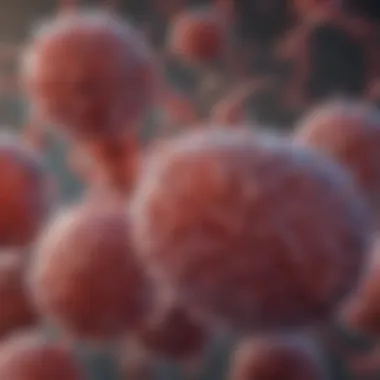Healing from MRSA: Strategies for Recovery and Prevention


Intro
Methicillin-resistant Staphylococcus aureus (MRSA) represents a significant challenge in modern medicine. This bacterium resists the effects of many commonly used antibiotics, making infections difficult to treat. As cases increase, the implications for healthcare, as well as individual patients, become more profound. Healing from MRSA is not only about addressing the immediate infection but also understanding the broader context of antibiotic resistance, treatment options, and prevention strategies. This article will explore these dimensions in detail, providing insights for students, researchers, and professionals alike.
Research Highlights
Overview of Key Findings
Recent studies highlight various treatment methods effective for MRSA infections. Research indicates that while conventional antibiotics may fail, alternative treatments show promise. Some notable findings include:
- Antibiotic Resistance Impact: MRSA infections lead to longer hospital stays, increased medical costs, and higher mortality rates.
- Alternative Therapies: Approaches like bacteriophage therapy and specific novel antibiotics present new options.
- Prevention Measures: Effective strategies, including hygiene and smart antibiotic usage, can help mitigate MRSA spread.
These findings underscore the need for comprehensive strategies to address MRSA effectively.
Significance of the Research
The significance of ongoing research into MRSA cannot be overstated. Understanding MRSA allows for the development of tailored treatment options. It also sheds light on the future of antibiotic resistance. As MRSA adapts, new approaches in therapy and prevention are crucial to combat its spread. This research contributes not only to academic understanding but also practical treatment solutions that can save lives.
Treatment Approaches
Conventional Medical Approaches
Conventional treatments typically involve the use of certain antibiotics. However, due to MRSA's resistance patterns, doctors must often resort to alternatives like:
- Vancomycin: Often the first line of defense against MRSA, although resistance is emerging.
- Daptomycin: Used particularly for complicated skin infections.
- Linezolid: Effective for pneumonia and skin infections caused by MRSA.
These options illustrate the importance of continued research to refine treatment protocols.
Alternative Treatment Strategies
In addition to traditional medicine, alternative therapies are being explored. Some promising approaches are:
- Bacteriophage Therapy: Utilizes viruses that specifically target bacteria, potentially bypassing antibiotic resistance.
- Local antiseptics and honey: Certain natural remedies have shown effectiveness in managing MRSA wounds.
This mix of strategies highlights a multifaceted approach toward healing.
Prevention Considerations
Preventing MRSA infections involves tactics that go beyond treatment. Important strategies include:
- Hygiene Practices: Regular handwashing and sanitizing surfaces can limit exposure and spread of MRSA.
- Smart Antibiotic Usage: Educating both healthcare providers and patients about appropriate antibiotic use can help combat resistance.
- Awareness Campaigns: Informed communities can better manage risks associated with infections.
Informing people about these strategies can assist in reducing overall incidence of MRSA.
Closure
Healing from MRSA encompasses a range of strategies from medical treatments to proactive prevention. As research continues to uncover new findings, both healthcare professionals and patients must remain vigilant. Understanding MRSA's complexities is key to navigating the path toward better health outcomes.
Understanding MRSA
Understanding Methicillin-resistant Staphylococcus aureus (MRSA) is essential for anyone seeking information on healing from such infections. Knowledge about MRSA provides insights into its behavior, its prevalence, and how it affects individuals and communities. MRSA is a type of bacteria that does not respond to commonly used antibiotics. This resistance poses significant challenges in treating infections, which can lead to severe complications if not managed properly. Consequently, awareness about MRSA can help in both the prevention and treatment process, ensuring that individuals remain informed and vigilant.
Definition and Characteristics
MRSA is a strain of Staphylococcus aureus that has developed resistance to methicillin and other beta-lactam antibiotics, such as penicillin and amoxicillin. This ability to resist treatment makes it a significant cause of healthcare-associated infections. MRSA can colonize the skin or other parts of the body without causing symptoms, which complicates efforts for early detection.
Characteristics of MRSA include:
- Gram-positive cocci: These spherical bacteria appear in clusters under a microscope.
- Resistant nature: MRSA's ability to resist methicillin complicates treatment options.
- Potential to cause a range of infections: From minor skin infections to life-threatening bloodstream infections.
- Transmission: Can spread through direct contact with an infected wound or contaminated surfaces.
Epidemiology
The epidemiology of MRSA reveals significant trends and impacts on public health. Initially identified in the 1960s, MRSA has emerged as a prominent concern in both healthcare settings and the community.
- Healthcare-associated MRSA (HA-MRSA): Primarily occurs in patients in healthcare facilities, such as hospitals and nursing homes.
- Community-associated MRSA (CA-MRSA): Develops in healthy individuals outside of healthcare settings.
The rise of MRSA infections has been linked to several factors:
- Overuse and misuse of antibiotics.
- Inadequate hygiene practices in healthcare facilities.
- Increased population mobility and close contact in community settings, such as schools and sports teams.
"Understanding the epidemiology of MRSA helps inform effective prevention strategies and treatment approaches."


Pathogenesis
Pathogenesis refers to the process through which MRSA causes disease. Understanding this process is crucial to effectively managing and treating infections.
MRSA enters the body typically through cuts, abrasions, or other breaches in the skin. Once inside, the bacteria can produce toxins and enzymes that facilitate tissue damage, enabling them to invade and spread.
Key points of MRSA pathogenesis include:
- Adhesion: MRSA adheres to host tissues, avoiding clearance by the immune system.
- Toxin Production: Produces a variety of toxins that contribute to inflammation and tissue damage.
- Immune Evasion: Can alter its surface proteins to evade immune detection.
The pathogenesis of MRSA is complex, and its effects can range from localized skin infections to severe systemic illnesses. Recognizing how MRSA operates within the body is essential in developing effective therapeutic approaches.
Symptoms of MRSA Infection
Identifying the symptoms of Methicillin-resistant Staphylococcus aureus (MRSA) infection is crucial for timely intervention. Understanding these symptoms can significantly impact the treatment and recovery process for individuals affected by MRSA. The presentation of symptoms can vary, thus recognizing them early enhances the potential for effective management and lowers the risk of complications. It is also important for healthcare providers and patients to differentiate between MRSA and other infections, as treatment approaches differ.
Cutaneous Manifestations
Cutaneous manifestations are typically the most common indicators of MRSA infection. The skin often serves as the initial site of infection. Common signs include:
- Boils: Raised, painful lumps that may fill with pus.
- Abscesses: Similar to boils, but can occur in other regions such as under the skin or in organs.
- Cellulitis: Red, swollen areas of skin that can become warm to touch, indicating inflammation.
- Pustules: Small, blister-like lesions that contain pus.
These symptoms can lead to significant discomfort and may become serious if left untreated. Infection at the skin level can spread to deeper tissues, making it essential to seek medical advice when these manifestations appear. If not addressed, the infection can also lead to systemic symptoms, highlighting the importance of recognizing cutaneous signs early.
Systemic Effects
When MRSA spreads beyond the skin, it can trigger systemic effects that affect the entire body. Recognizing these is vital for understanding the potential severity of an MRSA infection. Systemic symptoms may include:
- Fever: An elevated body temperature can indicate that the body is fighting an infection.
- Chills: Often accompanying fever, chills signify that immune response is active.
- Fatigue: A general feeling of tiredness or weakness can result from the body's effort to combat the infection.
- Nausea or Vomiting: These gastrointestinal symptoms may occur, complicating the clinical picture.
"Prompt recognition and treatment of MRSA infection can prevent severe outcomes, including sepsis, which is a life-threatening response to infection."
Systemic effects signal that MRSA is no longer confined to a localized area and require urgent medical evaluation. Awareness of these symptoms can be a pivotal factor in improving treatment outcomes and ensuring the safety of those affected by MRSA.
Diagnosing MRSA
Diagnosing methicillin-resistant Staphylococcus aureus (MRSA) is a pivotal step in managing these infections effectively. Accurate diagnosis not only facilitates timely treatment but also helps prevent the spread of this antibiotic-resistant organism. In this section, we will explore the critical elements of MRSA diagnosis, including the role of laboratory tests and clinical evaluations, each offering crucial insights into the presence of the pathogen.
Laboratory Tests
Laboratory tests are fundamental in diagnosing MRSA. These tests detect the presence of MRSA in clinical specimens, which can include blood, wound swabs, or nasal samples. The most common method is culture and sensitivity testing, where samples are grown in a lab to see if MRSA is present.
- Culture Tests: This involves growing bacteria from a sample in a controlled environment. If MRSA is present, specific colonies will form, confirming the infection. Cultures are essential as they can also determine antibiotic susceptibility, guiding effective treatment choices.
- Polymerase Chain Reaction (PCR): This molecular test can detect the genetic material of MRSA quickly. PCR offers a faster diagnosis compared to culture tests, with results often available within hours.
- Rapid MRSA Screening Tests: These tests have emerged as a significant advance in rapid diagnostics. They can identify MRSA from nasal swabs, making it easier to screen patients, especially in hospital settings.
Laboratory tests not only confirm the presence of MRSA but also play a role in understanding the resistance profile of the strain. The information gleaned from these tests is crucial for clinicians to tailor treatment strategies effectively.
"Early diagnosis through appropriate laboratory testing can significantly improve patient outcomes and minimize the spread of MRSA infections."
Clinical Evaluation
Clinical evaluation encompasses the assessment performed by healthcare professionals to diagnose MRSA. This process begins with a detailed patient history and physical examination.
- Patient History: Understanding the patient's past medical history, including prior MRSA infections or antibiotic use, can provide vital clues. Patients in high-risk environments, such as healthcare facilities, are assessed with greater scrutiny.
- Physical Examination: The healthcare provider evaluates the patient for typical MRSA symptoms, which may range from skin infections to systemic manifestations like fever or sepsis. Examinations of skin lesions, abscesses, or other areas of concern are conducted to determine if further testing is needed.
- Risk Assessment: Identifying risk factors is part of the evaluation process. Individuals with compromised immune systems, recent hospitalizations, or those who participate in contact sports may be at higher risk for MRSA infections and warrant closer examination.
In summary, the evaluation process is crucial for identifying potential MRSA infections early. By integrating both laboratory tests and clinical evaluations, healthcare professionals can adequately address and manage these infections, significantly impacting public health.
Conventional Treatment Options
Conventional treatment options are crucial for effective healing from MRSA infections. These strategies focus on eradicating the infection and preventing complications. Understanding these options is important because they shape the initial course of action in managing MRSA. Patients must also be aware of the potential limitations and challenges associated with these treatments.
Antibiotic Therapy
Antibiotic therapy plays a central role in treating MRSA. A unique aspect of MRSA is its resistance to methicillin and many other antibiotics. Therefore, healthcare providers often resort to alternative antibiotic classes like vancomycin, daptomycin, or linezolid to combat the infection.
It is important to note that the selection of antibiotics can depend on several factors:
- Type of infection: Different antibiotics target specific strains and locations of MRSA. For instance, a skin infection may require different management than a bloodstream infection.
- Patient health: Factors such as allergies or concurrent medical conditions influence the choice of antibiotics.
- Resistance patterns: Ongoing surveillance for antibiotic resistance informs treatment decisions.
Proper use of antibiotics is fundamental. However, overuse leads to further resistance, necessitating the careful stewardship of these medications. Regular monitoring of laboratory results helps shape the course of treatment.
"Antibiotic resistance is a significant issue in today's medical landscape. Responsible management of antibiotic therapy is essential for effective treatment and the preservation of future options."


Surgical Interventions
Surgical interventions may be necessary for managing MRSA infections, especially if there are abscesses or deep tissue infections. Such procedures aim to remove infected tissue, thus aiding in the overall healing process.
Some key points to consider about surgical interventions include:
- Procedure types: Commonly, drainage of abscesses or necrotic tissue removal is performed, depending on the infection's severity.
- Timing and urgency: In some cases, immediate surgical intervention is needed to prevent further complications, such as sepsis.
- Post-operative care: Close monitoring and appropriate follow-up are crucial to ensure effective recovery and prevent recurrence.
The combination of antibiotic therapy and surgical interventions often provides a more comprehensive approach to treatment. This two-pronged strategy not only targets the infection but also supports the body’s natural healing processes.
Exploring Alternative Treatments
Alternative treatments play a significant role in the landscape of healing from MRSA infections, especially as antibiotic resistance grows. These approaches often aim to complement conventional therapies, offering patients more options for recovery. The importance of exploring alternative treatments lies in the potential benefits they may provide, alongside considerations regarding their efficacy and safety. Review of these options can also help in understanding the holistic needs of patients, addressing not only the pathogen but the overall well-being of the individual.
Phage Therapy
One promising approach in treating MRSA is phage therapy. This method utilizes bacteriophages—viruses that infect and kill bacteria. Unlike traditional antibiotics that target a broad range of bacteria, phage therapy is more specific. This specificity can reduce harm to beneficial bacteria in the gut and minimize side effects, offering an innovative solution in cases where standard treatments fail.
Phage therapy offers a targeted method for combating antibiotic-resistant infections like MRSA. Its potential makes it a focus for current medical research.
Current studies are investigating the optimal ways to apply phage therapy, including the isolation of effective phages and understanding their interactions with bacterial biofilms. The ability to personalize therapy based on the strain of MRSA further enhances its potential effectiveness. However, challenges remain, such as regulatory hurdles and the need for extensive research to establish long-term safety and efficacy.
Herbal Remedies and Supplements
Herbal remedies and dietary supplements are another avenue for those recovering from MRSA. Various plants have shown antimicrobial properties that might be beneficial in supporting the body during recovery. For example, extracts like garlic (Allium sativum) and tea tree oil (Melaleuca alternifolia) have been studied for their ability to reduce bacterial load.
When considering herbal treatments, patients should be aware of the following points:
- Potential Interactions: Herbal supplements may interact with conventional medications, so consulting a healthcare provider is essential.
- Quality Control: The efficacy of herbal products can vary based on sourcing and processing. Choose high-quality, standardized products.
- Complementary Role: These remedies should not replace conventional treatments but can serve to support overall health and immune function.
Incorporating natural supplements into a healing regimen may also enhance physical and mental well-being during recovery. However, more rigorous clinical trials are needed to establish their role and confirm their efficacy against MRSA specifically.
Research efforts continue to explore both phage therapy and herbal remedies, pushing the frontier of what might be possible in treating MRSA infections. Understanding these alternative strategies provides valuable insight into comprehensive care approaches that acknowledge both physical and psychological aspects of health.
The Role of Prevention
Prevention plays a critical role in managing Methicillin-resistant Staphylococcus aureus (MRSA) infections. Effective preventive strategies not only reduce the risk of infection but also curb the spread of antibiotic resistance. The implications for public health are profound, as MRSA can lead to serious health complications if left unchecked. By prioritizing prevention, healthcare systems can alleviate the burden on patients and healthcare resources alike.
Hygiene Practices
Maintaining proper hygiene is one of the fundamental pillars of preventing MRSA infections. Basic personal cleanliness can go a long way in protecting individuals from harmful bacteria. Here are some key hygiene practices:
- Regular Hand Washing: Frequent hand washing with soap and water, especially after touching potentially contaminated surfaces, can effectively remove pathogens. When soap and water are unavailable, hand sanitizers containing at least 60% alcohol can be used.
- Wound Care: Keeping cuts and scrapes clean and covered is essential. Bacteria can enter the body through open wounds, making it important to apply sterile bandages and change them regularly.
- Avoid Sharing Personal Items: Using personal items like towels, razors, or clothing can facilitate the spread of MRSA. Education about the risks of sharing these items is critical in community settings.
- Disinfect Surfaces: Regularly disinfecting high-touch surfaces can help minimize the risk of transmission, particularly in shared environments like gyms and schools.
Education and Awareness
Education and awareness about MRSA are vital components of an effective prevention strategy. Informing individuals about the nature of MRSA and its transmission can significantly influence behavior change. Key educational strategies include:
- Health Campaigns: Public health campaigns can raise awareness about the symptoms, prevention strategies, and the importance of early treatment in controlling MRSA infections.
- Training for Healthcare Workers: Healthcare professionals must be trained to recognize MRSA promptly. This includes understanding the importance of hygiene practices in clinical settings.
- Community Outreach: Targeting schools, gyms, and community centers with tailored information can help reduce stigma associated with MRSA while promoting preventive measures.
Educating the public about the significance of MRSA prevention is crucial, as informed individuals are more likely to adopt healthy behaviors that protect themselves and their communities.
- Interactive Workshops: Organizing workshops that promote hygiene and provide practical skills can empower individuals with the knowledge they need to prevent infections.
In summary, a well-rounded approach to prevention that combines effective hygiene practices with comprehensive education can significantly mitigate the risk of MRSA infections. Identifying potential transmission pathways provides a clearer understanding of how to implement lasting changes that protect public health.
The Impact of Antibiotic Resistance
Antibiotic resistance remains a critical challenge in modern medicine, particularly in the context of Methicillin-resistant Staphylococcus aureus (MRSA). Understanding this topic is essential for appreciating the complexities involved in healing from MRSA infections. The key elements of this issue involve recognizing how resistance affects treatment options, public health outcomes, and the resource allocation within healthcare systems.
National and Global Trends
The rise of antibiotic resistance has been documented worldwide, with various studies highlighting significant statistics. In the United States alone, the Centers for Disease Control and Prevention (CDC) reports that at least 2.8 million antibiotic-resistant infections occur each year, leading to more than 35,000 deaths. Globally, the World Health Organization (WHO) emphasizes that antibiotic resistance is escalating and becoming a severe threat to effective treatment of infections.
MRSA exemplifies these trends. The bacteria's ability to develop resistance to commonly used antibiotics is alarming. This phenomenon occurs due to overuse and misuse of antibiotics, which creates selective pressures encouraging the survival of resistant strains. Consequently, infections that were once easily treatable are now becoming increasingly difficult to manage, requiring novel approaches and greater awareness among healthcare providers and patients alike.
Policy and Practice Initiatives
Addressing antibiotic resistance necessitates a multifaceted strategy. Governments and health organizations are implementing various policy and practice initiatives aimed at combatting this issue.
- Antibiotic Stewardship Programs: These programs are designed to optimize antibiotic usage. By promoting guidelines for appropriate prescribing and monitoring antibiotic prescriptions, healthcare providers can contribute to reducing the emergence of resistance.
- Public Awareness Campaigns: Educating the public about the risks associated with antibiotic misuse is vital. Campaigns encourage responsible antibiotic use, and they support individuals in understanding when these medications are truly necessary.
- Research and Development Funding: To foster innovation, governments and organizations are prioritizing investments in research. Novel antibiotics, alternate therapies, and diagnostic tools are being developed to address the challenges posed by resistant bacteria.
- Global Collaborations: International partnerships are crucial for tackling antibiotic resistance. Collaboration among healthcare systems can enhance information sharing and establish standardized practices across borders. Such measures can fortify overall preparedness against future threats.


"Antibiotic resistance is a global public health crisis that requires concerted efforts at multiple levels of society to mitigate its impact."
In summary, the implications of antibiotic resistance, particularly as they pertain to MRSA, underscore the urgent need for systematic changes in our approach to treatment, policy implementation, and public education. Understanding these elements is critical for anyone involved in managing or mitigating the effects of MRSA infections.
Research and Future Directions
Research and future directions in the context of MRSA are integral to developing effective means of treatment and management. As antibiotic resistance continues to emerge as a significant public health concern, ongoing research is vital in uncovering new strategies. This section explores current studies and innovations in the field, highlighting their importance for future healing approaches against MRSA infections.
Current Studies on MRSA
Current research efforts on MRSA focus on various aspects, from understanding its genetic makeup to exploring novel treatment options. Researchers are conducting studies to investigate the mechanisms of resistance in MRSA and identify potential biomarkers for infections. These biomarkers can lead to quicker diagnosis and more tailored treatments for patients.
Moreover, clinical trials are underway to assess the efficacy of new antibiotic agents. One promising area of investigation is the synergy between existing antibiotics and adjuvants. This approach seeks to enhance the effectiveness of antibiotics against resistant strains. The results from these studies are critical for informing guidelines and recommendations in clinical practice.
In addition to pharmacological studies, researchers are exploring the role of the microbiome in MRSA infections. Understanding how normal flora can influence resistance patterns may reveal new preventive techniques. It is also important to consider the socio-economic factors that affect the spread of MRSA, which leads to subsequent research in public health strategies.
Innovations in Treatment Strategies
Innovative treatment strategies are essential to equip healthcare professionals in the battle against MRSA. Beyond conventional antibiotic therapies, several cutting-edge approaches are gaining traction. For instance,
- Phage therapy is being revisited, leveraging bacteriophages to target and eliminate MRSA. This strategy offers an alternative especially in cases of antibiotic failure.
- Nanotechnology is being used to deliver medications more effectively. Nanoparticles can enhance the penetration of antibiotics into bacterial cells, potentially overcoming resistance.
- Immunotherapy is another promising field, where treatments aim to boost the body’s immune response to fight MRSA infections. Vaccines designed to induce specific immunity against MRSA could radically alter treatment protocols.
Research also involves assessing combination therapy wherein multiple approaches are merged to combat MRSA. Such strategies might include a mix of antibiotics with non-antibiotic treatments to create a more robust intervention against the pathogen.
Living with a History of MRSA
Living with a history of MRSA can be challenging and requires careful consideration of various elements. Understanding the implications of previous MRSA infections is crucial for overall health and well-being. As antibiotic-resistant infections like MRSA become more prevalent, those with a history may find themselves facing unique psychological and physical challenges.
Moreover, the knowledge of having had an MRSA infection can evoke feelings of anxiety or fear regarding future infections. Therefore, psychological support and coping strategies become essential. Additionally, maintaining a focus on long-term health considerations is vital in ensuring that past infections do not dictate present or future health outcomes.
Psychological Implications
The psychological implications of living with a history of MRSA are often overlooked. Many individuals experience a range of emotions when they think about their past infection. Anxiety about recurrence can lead to a heightened perception of cleanliness and safety. This can create stress and disrupt daily routines.
It is crucial for individuals to seek support from mental health professionals if feelings of anxiety or depression persist. Support groups, community resources, or online forums can provide solidarity and understanding. Engaging with others who share similar experiences can facilitate emotional healing and foster resilience.
"Living with a history of MRSA can be a silent burden, yet the right support can break the isolation."
Maintaining open communication with healthcare providers about psychological concerns is also important. Case by case, they can assist in developing coping strategies that suit individual needs.
Long-term Health Considerations
Long-term health implications after an MRSA infection deserve attention. While many recover fully, lingering effects on physical well-being can occur. Individuals may be more susceptible to skin infections, bacteria, or even complications in the future. Therefore, ongoing monitoring and regular check-ups are encouraged.
Preventative measures can bolster physical health. These include:
- Regular skin checks to identify and address any new issues early.
- Maintaining a strong immune system through a balanced diet, exercise, and adequate sleep.
- Practicing effective hygiene measures to minimize the risk of future infections.
Awareness of one's health status can empower individuals. By taking proactive approaches to manage their health, they can minimize risks associated with past infections. Education on MRSA can further enhance awareness and encourage responsible health behaviors in the community.
In summary, living with a history of MRSA involves a blend of psychological care and physical health management. Acknowledging both aspects will lead to improved outcomes and quality of life.
Integrating Treatment Approaches
Integrating treatment approaches is crucial for effectively addressing the challenges posed by Methicillin-resistant Staphylococcus aureus (MRSA). With the increasing prevalence of antibiotic resistance, a multifaceted strategy is necessary that combines traditional medical interventions with alternative therapies and lifestyle modifications. This holistic view not only aims to eliminate the MRSA infection but also to enhance the patient's overall well-being. By considering various treatment modalities, healthcare providers can create a more personalized care plan that reflects the unique needs of each patient.
Effective integration might include assessing the type of MRSA infection, potential allergies to medications, and the patient's overall health status. This thorough understanding allows for the development of a tailored approach, acknowledging that a one-size-fits-all solution is insufficient when dealing with complex infections like MRSA.
There are multiple benefits to this integrated method. Patients are more likely to adhere to treatment plans that they perceive as comprehensive and supportive of their overall health. Moreover, collaborative care among healthcare providers—including doctors, nutritionists, and mental health professionals—can facilitate more effective recovery pathways.
"A diverse treatment approach not only targets the infection but also supports the patient's physical and mental health, contributing to better outcomes."
Furthermore, this integration must be balanced with considerations about the potential for interactions between different treatment modalities. Patients and healthcare professionals should remain vigilant about the efficacy and effects of combining treatments. This awareness is necessary, especially with alternative therapies, which may not always be compatible with conventional treatments.
Holistic Perspectives
Holistic perspectives in treating MRSA emphasize recognizing the patient as a whole rather than narrowly focusing on the infection alone. This approach takes into account various aspects of health, including emotional, nutritional, and environmental factors that can influence recovery. For example, patients are encouraged to maintain a balanced diet, engage in stress-reducing practices, and foster supportive relationships, all of which can bolster their immune system.
Common holistic practices include:
- Nutritional supplements tailored to boost immune function.
- Mindfulness and stress-management techniques such as meditation.
- Physical activities suitable for the patient's condition to enhance overall vigor.
These practices can be combined with conventional medical treatments, aiding in faster recovery and potentially reducing the duration of antibiotic use, thereby combating the growing concern of antibiotic resistance.
Collaborative Care Models
Collaborative care models focus on teamwork among various health professionals. This approach is vital in MRSA treatment due to the complexity of the infection and its management, necessitating contributions from multiple specialties. Effective collaboration might include:
- Infectious disease specialists who handle the specifics of MRSA treatment.
- Nurses who monitor patient progress and provide essential support.
- Pharmacists who offer guidance on medication interactions and side effects.
- Dietitians who can recommend nutrition that supports healing and health.
- Mental health professionals to assist with the psychological impact of living with an infection.
The essence of collaborative care lies in communication. Regular case discussions and updates among team members ensure that every facet of the patient's health is considered. This holistic approach aligns care strategies, improving patient outcomes and enhancing satisfaction.







